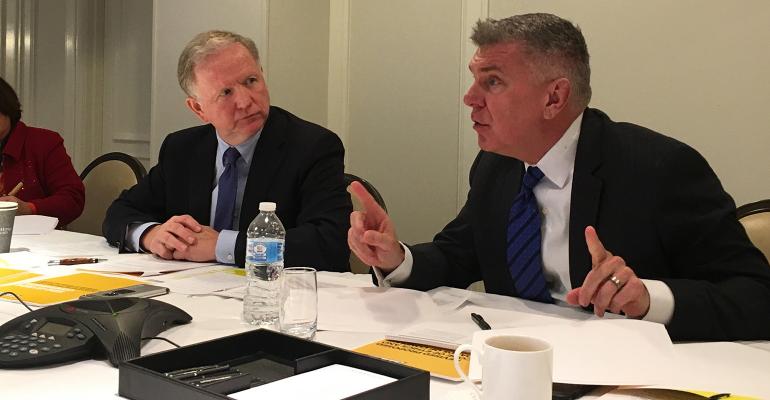The CFP Board released its revised proposed code of ethics and standards of conduct, and will take additional comments for 30 days starting Jan. 2. While the revised proposal retains the extension of the fiduciary standard to all financial advice, as the first proposal set out, the newest version removes the requirement for certain disclosures an advisor would have to make before entering into a formal relationship with the client.
“The revised proposed draft does remove certain pre-engagement disclosure requirements, and this was in recognition of the need to be practical in the application of our standards with business models that have unique needs,” said Blaine Aikin, chair of the board of directors of the CFP Board. “While consumers do certainly benefit from receiving relevant information when deciding who they want to retain for financial advice, we felt it was far more important that the advice is delivered by a professional committed to acting as a fiduciary.”
Aikin said larger firms and those that offer various types of services, in particular, would be affected by the pre-engagement disclosure requirements. Call centers would also find it problematic.
“You might have instances where you have CFP professionals working side-by-side with non-CFP professionals, so it becomes more and more problematic as you start to have obligations for disclosure at a time even before the relationship,” Aikin said. “And they’re going to have be different based upon whether the employee is a CFP professional or not.”
The newest proposal also removes the “Rebuttable Presumption that the Practice Standards Apply,” to avoid “unintended consequences,” the group said. That provision laid out a presumption that a CFP professional providing financial advice is required to integrate financial planning in their client engagements. But commenters felt it was an unnecessary requirement that financial planning be a mandatory part of any type of engagement, Aikin said.
“In reality, that is not always the case. Someone may not be pursuing financial planning, or they may choose to decline financial planning, which is addressed elsewhere in the standards overall.”
“It was really intended to indicate that there are circumstances under which an individual client would be expecting financial planning and then likewise the CFP Board would expect that a Certified Financial Planner professional would be providing that financial planning according to a reasonable expectation. This was a way to clarify that this is not an all-of-the-time, with-all-clients obligation.”
The CFP Board received over 1,300 written comments—a record for the organization—on its first proposed revised standards, which came out in June. The group will hold a second comment period from Jan. 2 to Feb. 2. They expect to release the final standards by the end of the first quarter 2018 and for the standards to take effect Jan. 1, 2019.
The CFP standards have not been updated since January 2009. Under the current standard, fiduciary duty applies when providing financial planning. It would apply to all financial advice under the new rules.
The organization conducted a survey of about 1,000 CFP professionals about the first revised standards and found that 96 percent of respondents agreed that CFPs should be required to act in their client’s best interest when providing financial advice. The Financial Planning Association, National Association of Personal Financial Advisers and consumer organizations supported the initial proposal. But brokerage industry advocates, including the Securities Industry and Financial Markets Association and Financial Services Institute opposed the expansion of fiduciary duty and encouraged the CFP Board to wait for the Securities and Exchange Commission and the Department of Labor to address the issue.
“The cat is out of the bag on fiduciary,” said Kevin Keller, CEO of the CFP Board. “We understand there are conversations going on among the various regulators about what should and may happen, but the public has this expectation, and these standards, I think, are responsive to that and appropriate for the delivery of financial advice and planning.”





